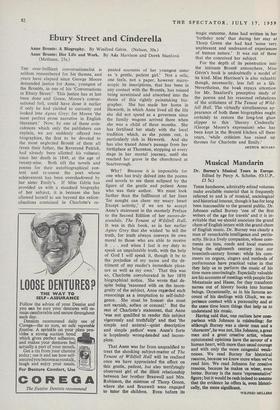Ebury Street and Cinderella
Anne Bronte: A Biography. By Winifred Germ. (Nelson, 30s.) Anne Bronte: Her Life and Work. By Ada Harrison and Derek Stanford. (Methuen, 25s.)
THE over-brilliant conversationalist is seldom remembered for his themes, and years have elapsed since George Moore demanded justice for Anne, youngest of the Brontes, in one of his 'Conversations in Ebury Street.' This justice has at last been done and Gosse, Moore's conver- sational foil, could have done it earlier if only he had yielded to curiosity and looked into Agnes Grey: for Moore 'the most perfect prose narrative in English literature.' Now, by one of those coin- cidences which only the publishers can explain, we are suddenly offered two biographies, the first to be devoted to the most neglected Brontë of them all (even their father, the Reverend Patrick, had already been allotted his volume), since her death in 1849, at the age of twenty-nine. Both sift the novels and poems for their autobiographical con- tent and re-assess the poet whose achievement has been overshadowed by her sister Emily's. If Miss Gerin has provided us with a standard biography of her subject, it is because she has allowed herself to see beyond the ration- alisations contained in Charlotte's re-
peated accounts of her youngest sister as 'a gentle, patient girl.' Not a relic, one feels, not a paper, however micro- scopic its inscriptions, that has been in any contact with the Brontes, has missed being scrutinised and absorbed into the thesis of this rightly painstaking bio- grapher. She has made her home in Haworth, in which Anne lived all the life she did not spend as a governess since the family wagons arrived there when she was a child of three months. She has fertilised her study with the local tradition which, as she points out, is particularly rich in Haworth. And she has also traced Anne's passage from her birthplace at Thornton, stopping at every stage in her mortal journey, until she reached her grave in the churchyard at Scarborough.
Why? Because it is impossible for one who has truly delved into the poems and novels to see them eclipsed by the figure of the gentle and patient Anne who was their author. We must look farther than the fulfilment of her lines 'for nought can cheer my weary heart Except activity,' if we are to accept Anne's statement in the masterly Preface to the Second Edition of her succes-de- scandale, The Tenant of Wildfell Hall. It was in this book, as in her earlier Agnes Grey that she wished 'to tell the truth, for truth always conveys its own moral to those who are able to receive it . . . and when I feel it my duty to speak an unpalatable truth, with the help of God I will speak it, though it be to the prejudice of my name and the de- triment of my reader's immediate pleas- ure as well as my own.' That this was so, Charlotte corroborated in her 1850 biographical notice. She wrote that de- spite being 'reasoned with on the incon- gruity of the subject, Anne regarded such reasonings as a temptation to self-indul- gence. She must be honest: she must not varnish, soften or conceal.' But the rest of Charlotte's statement, that Anne 'was not qualified to render this subject vigorously and truthfully' and that 'the simple and natural—quiet description and simple pathos' were Anne's forte is hopelessly wrong-headed and incom- plete.
That Anne was far from unqualified to treat the shocking subject-matter of The Tenant of Wildfell Hall will be realised once we have appreciated the effect on this gentle, patient, but also terrifyingly observant girl of the illicit relationship between her brother Branwell and Mrs. Robinson, the mistress of Thorp Green, where she and Branwell were engaged to tutor the children. Even before its
tragic outcome, Anne had written in her 'birthday note' that during her stay at Thorp Green she had had 'some very unpleasant and undreamt-of experiences of human nature.' It was out of these that she conceived her subject.
For the depth of its penetration into the intimate Bronte atmosphere, Miss Gerin's book is undoubtedly a model of its kind. Miss Harrison's is also valuable though, necessarily, less full as a life. Nevertheless, the book repays attention for Mr. Stanford's preceptive study of the poems and his reasoned refutations of the criticisms of The Tenant of Wild- fell Hall. The virtually simultaneous ap- pearance of both these biographies ought certainly to restore the long-lost glass slipper to this 'literary Cinderella' (George Moore's expression) who has been kept in the Bronte kitchen all these years, 'while criticism has raised up thrones for Charlotte and Emily.'
ARTHUR BOYARS






































 Previous page
Previous page